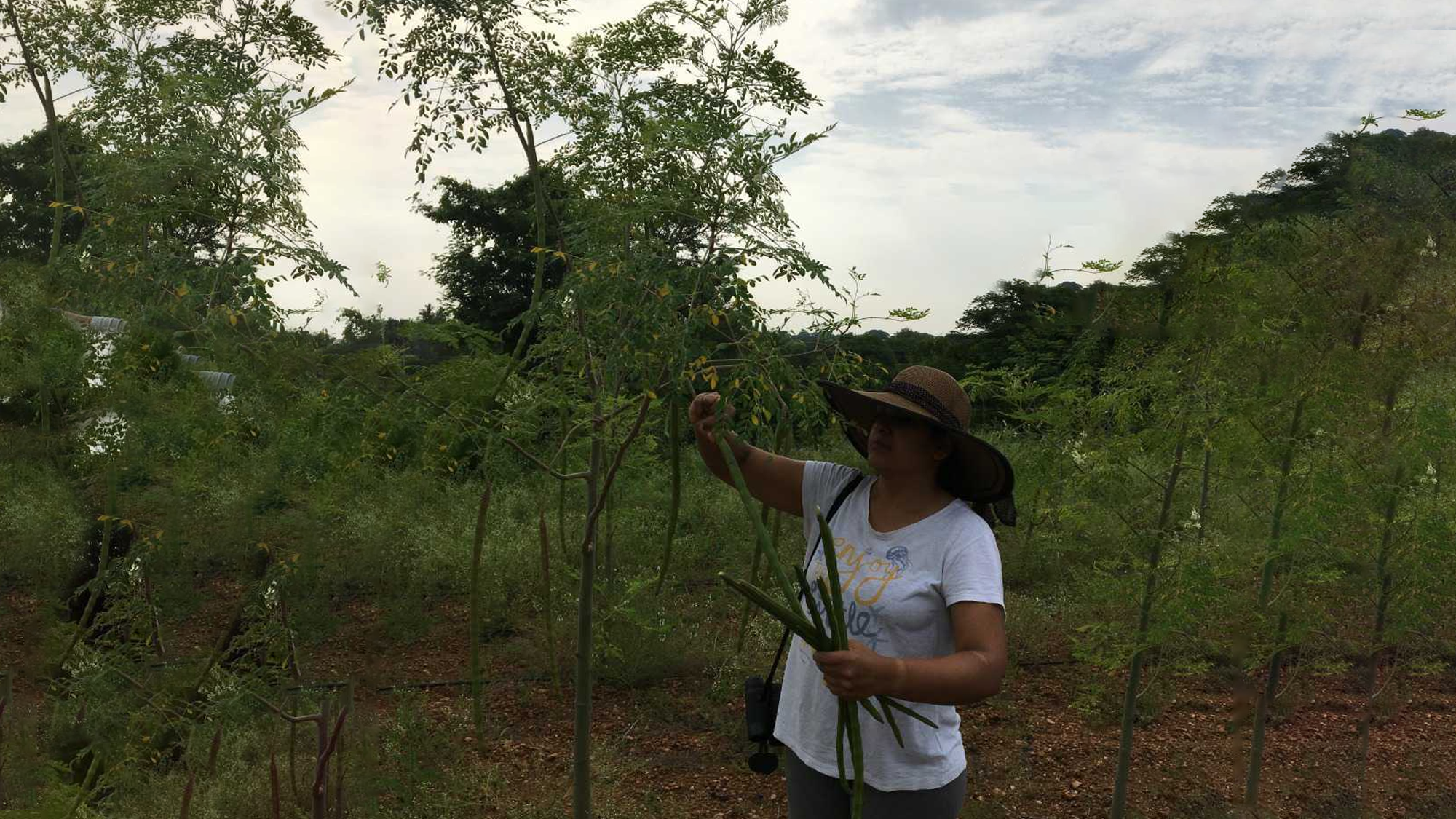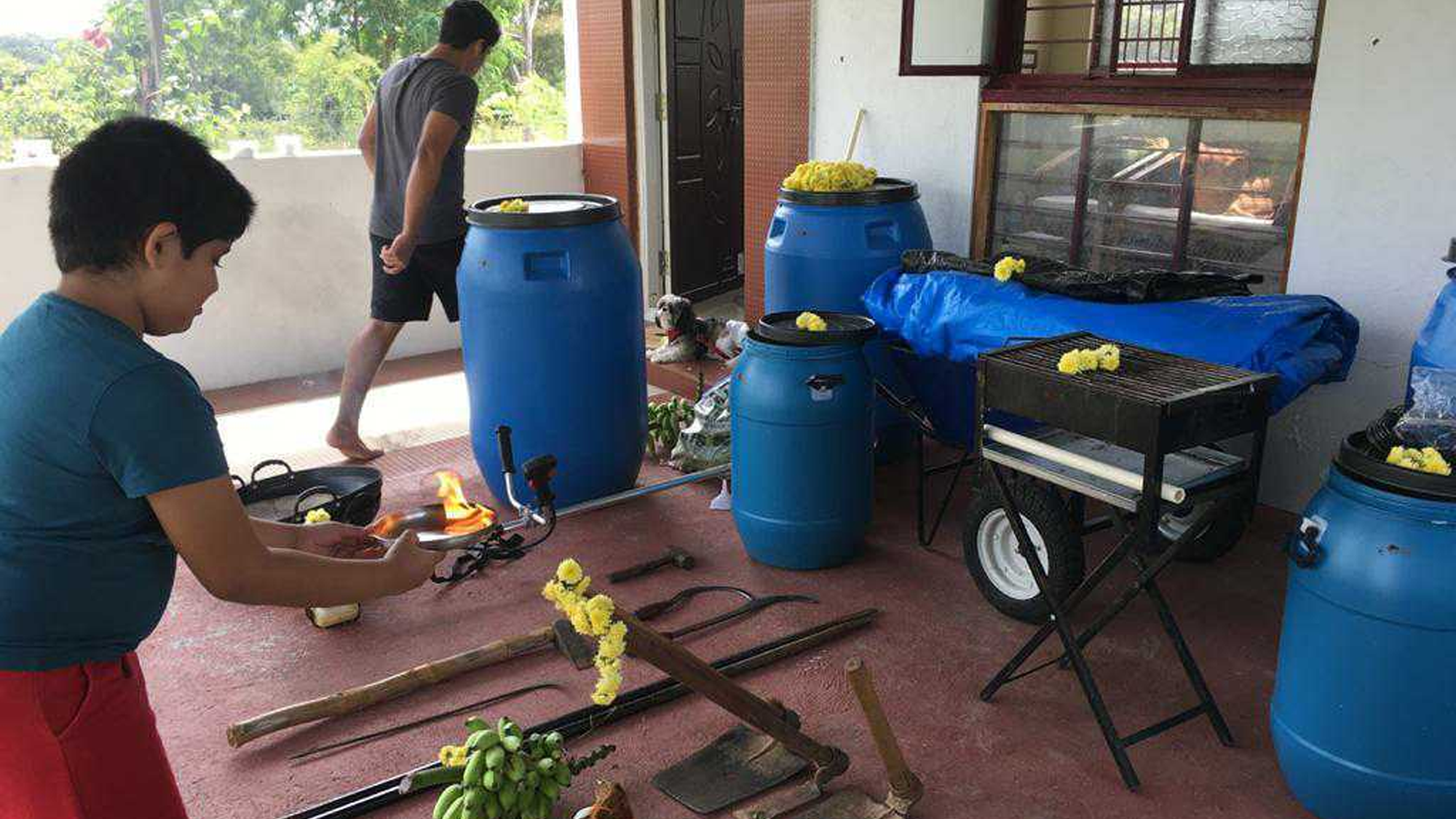How Ramya Coushik farmed her way to bliss and fulfilment
4 March 2021 — Written by Mihika Shankar

As a product of conventional schooling, I often wondered why the most magical journey of finding one’s ikigai is forced to take place before a learner finishes higher education. Young people are somehow conditioned to take a fight or flight approach to careers, making them dismiss the opportunity of lifelong and life-wide learning!
What, then, happens when people find their true calling only in their 30s or 40s? Is it too late to take a detour and start over in a field that you love? I happened to ask this question of a dear friend Ramya Coushik, who rekindled her passion for farming in her 40s, after a flourishing corporate career.

Most areas of Navilu Kaadu are wild and we de-weed only when necessary. This has created patches of tiny habitat for many life forms. To me, the most fulfilling moments of life on the farm is every time I spot nests of bulbuls, larks, peahens, and grey francolins, or spot a black-naped hare, a colony of dwarf honeybees, or a snake, which is an everyday occurrence on the farm.
In your opinion, what are the greatest challenges our planet faces today and how can young people join the movement?
The biggest challenge our planet faces today is human consumption and desecration. Our planet is more resilient than we imagine and will find a way to oust us. We humans need saving from ourselves. While we speak of renewable energy, afforestation, carbon credits and more as possible ways to compensate for the ruin humans have unleashed on Earth, I personally feel that scaling back on human consumption itself is the only way to live on this planet.
The compensatory actions, while welcome, can never be substitutes to preserving our ancient forests, trees, rivers, oceans and the flora and fauna they sustain. What is once lost, can rarely be regained, or recreated as it has taken millions of years to arrive at the ecological balance that we witness today.
Beyond any grand movement, embracing minor lifestyle changes can add up to big gains. Here are a few easy ways to reduce one’s footprint on the planet.
- Buy less and reuse more.
- Become a ‘locavore’. Procure and consume seasonally available, local produce with minimal and biodegradable packaging. Citing my own example, I purchase a month’s worth of groceries from a store in Mysore that stocks naturally grown, seasonal staples and vegetables, and value-added products made by small businesses. All staples are stored in large containers with minimal or zero packaging. I also buy breads from home-bakers in the area I live in after making enquiries on the ingredients they use. This way, I am guaranteed quality products and can minimize the packaging I bring along with each purchase. This has also helped minimize the waste and garbage we generate, while supporting small business owners.
- Volunteer for clean-up drives, lake surveys, bird counts and other citizen initiatives. Take an interest in the upkeep of natural habitats in our vicinity such as city lakes, grasslands, wetlands, trees, green spaces in the city and its outskirts.
- Join one of the many nature groups in your city who organize weekend birdwatching, butterfly-watching and tree-watching trips. Such groups don’t just help cultivate a love for the natural world around, they also assume the role of custodians of the natural spaces they visit and are the first to come together, voice out concerns and take up matters with government authorities if they spot violations or infringements of our natural spaces.
- Minimize ordering-in, as the food inevitably comes with packaging. Carry your own bowls when you visit eateries that serve in disposable containers. We prefer picking up orders ourselves over deliveries. We have a set of steel boxes set aside for when we pick up food from outside.
- Carry your own water bottle everywhere you go and have a set of cutlery handy (including a steel straw) when you travel.
- Ditch paper tissues and embrace reusable cloth napkins and handkerchiefs.
- Boot out household chemical cleaning agents. They are harmful to human health and pollute our waterways when they enter the sewage system. There are many easy recipes on the web for safe, home-made cleaning agents.
- Avoid plastic garbage bin liners as they just add to the burgeoning plastic waste. We just wash the bin after emptying it each day.
How has your life changed ever since you found and followed your ikigai?
It wouldn’t be overstating it to say that restoring and rejuvenating a land that was once poisoned with toxic chemicals has lent purpose to my own life. Caring for Navilu Kaadu hasn’t been easy by any measure, especially because we do not live on the farm full time owing to the children’s school schedules and our jobs. Labour issues abound, repairs and maintenance are perpetual, and the crops need to be nourished and watered regularly.
Most of our neighbours are daily-wagers and small and marginal farmers, who lead a precarious existence and must work extremely hard to fulfil the most basic needs in life. But they go about their days cheerfully, take each day as it comes and hold village fairs and festivals at the drop of a hat. This opportunity to live, work and experience life in our rural hinterlands has helped develop an alternate perspective to life, one that is filled with gratitude and despair in the same measure, at the stark contrasts between city-living and the lives of our brethren in the villages.
How lucrative is farming?
We are yet to break even with our operations at Navilu Kaadu. Having said that, monetary gains wasn’t the top priority when we ventured into farming. Profits can and should go beyond the narrow definition of monetary returns. The deep sense of satisfaction and the opportunity to turn custodians of this little patch of earth is reward enough.
We are in our fourth year at Navilu Kaadu, and recently, we have been observing new beings taking up residence alongside us at the farm. One such species is a family of calotes or garden lizards. Garden lizards are bioindicators of pesticide contamination and can never survive on farmlands sprayed with chemicals. That these lizards have chosen to make Navilu Kaadu home, is an honour and my most cherished form of profit.
What advice would you give people in their 30s and 40s who believe it is too late to pursue their ikigai?
It took many years to extricate myself from the norms and expectations that society and family burdens us with. Finding Navilu Kaadu took 6 years of extensive search. I took up farming after we turned 40, much against the advice of many who cautioned, and even derided us for what they believed was a foolhardy decision. We were told that a site or a villa in Bengaluru would be more worthy investments.
We all have our own journeys. Cultivating self-awareness and finding the time and the resources to immerse oneself in fulfilling pursuits, whatever they mean to each of us, is as important as making a living and being moneywise. Blinkered societal notions of timelines, materialistic trappings, age limits, others’ judgements of your own capabilities and life priorities, are merely barriers that exist to be transcended.
We have but one life. Whatever one’s age or gender, we owe it to ourselves to pursue what makes us happy.
I will end with a few sentences from a talk by Steve Jobs – “Don’t let the noise of others’ opinions drown your own inner voice. And most important, have the courage to follow your heart and intuition.”
Loved Ramya’s story? Read more on her farming experiences and the natural world on her blog www.bluejaydiaries.com. She also contributes to the BBC, RoundGlass Sustain, The Hindu, Deccan Herald and JLR Explore, the official blog of Jungle Lodges and Resorts. You can follow Ramya on Instagram (@ramyacoushik) and Twitter (@rcoushik) for picturesque glimpses into life at Navilu Kadu.